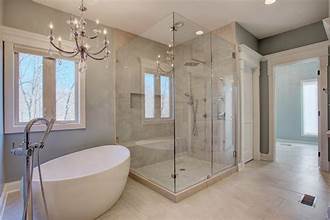Embark on a journey into the world of bathroom remodeling contractors, where expertise meets creativity to transform your space into a haven of luxury and functionality. Learn the ins and outs of selecting the right professionals and crafting your dream bathroom.
Delve deeper into the intricacies of each phase, from initial consultations to quality assurance, as we unravel the secrets to a successful remodeling project.
Finding Bathroom Remodeling Contractors
When it comes to finding reputable bathroom remodeling contractors, it's essential to do thorough research to ensure you hire the right professionals for the job. Here are some tips to help you in your search:
Checking for Licenses, Insurance, and References
Before selecting a contractor, always make sure to check if they are properly licensed and insured. This is crucial as it guarantees that the contractor meets the necessary requirements to perform the work. Additionally, ask for references from past clients to get an idea of their work quality and reliability.
- Verify the contractor's license status with the relevant licensing board in your area.
- Ask for proof of insurance, including liability and workers' compensation coverage.
- Contact the references provided by the contractor and inquire about their experience working with them.
Importance of Reading Reviews and Asking for a Portfolio
Reading reviews from previous clients can give you valuable insights into the contractor's reputation and the quality of their work. Additionally, asking for a portfolio of past projects allows you to see the contractor's style and capabilities firsthand.
- Check online reviews on platforms like Google, Yelp, or Angie's List to see what past clients have to say about the contractor.
- Request a portfolio of the contractor's past projects to assess their workmanship and design aesthetic.
- Look for consistency in the quality of work and pay attention to details in the portfolio.
Initial Consultation and Planning
When beginning the process of remodeling your bathroom, scheduling an initial consultation with a professional contractor is a crucial first step. During this consultation, you will have the opportunity to discuss your design ideas, budget constraints, and desired timeline for the project.
It is essential to be prepared and know what to expect during this meeting to ensure a smooth and successful renovation process.
Scheduling the Consultation
To schedule an initial consultation with a bathroom remodeling contractor, you can typically reach out to them via phone or email. Many contractors offer free consultations to discuss your project and provide an estimate. It is recommended to contact multiple contractors to compare prices, services, and availability before making a final decision.
What to Expect
- Discuss Design Ideas: Be prepared to share your vision for the new bathroom, including layout preferences, color schemes, and any specific features you would like to incorporate.
- Budget Discussion: The contractor will go over your budget and provide recommendations on how to achieve your desired results within your financial constraints.
- Timeline Planning: Establishing a timeline for the project is crucial to ensure that the renovation is completed in a timely manner. The contractor will discuss the estimated duration of the project and key milestones.
Preparing for the Consultation
Prior to the consultation, it is helpful to create a list of questions you have for the contractor. This can include inquiries about their experience, previous projects, and the process they follow. Additionally, gathering inspiration images from magazines, websites, or social media can help convey your style preferences to the contractor.
Design and Material Selection
When it comes to bathroom remodeling, the design and material selection play a crucial role in achieving the desired look and functionality. Working closely with your contractor to finalize the bathroom design is essential to ensure that your vision is brought to life.
Here are some tips on selecting materials for flooring, fixtures, tiles, and countertops, as well as how to balance aesthetics with functionality in choosing design elements.
Material Selection Tips
- Consider the durability of materials: Opt for materials that can withstand the moisture and humidity present in a bathroom, such as ceramic or porcelain tiles for flooring.
- Choose cohesive materials: Select materials that complement each other in color, texture, and style to create a cohesive and harmonious look in the space.
- Focus on maintenance: Pick materials that are easy to clean and maintain to ensure the longevity of your bathroom renovation.
- Budget wisely: Allocate your budget wisely by investing in high-quality materials for key elements like fixtures and countertops, while saving on less prominent areas.
Design Element Balance
- Functionality first: Prioritize functionality when selecting design elements, such as opting for a shower with convenient storage shelves or a vanity with ample counter space.
- Personal style: Infuse your personal style into the design by selecting fixtures, tiles, and colors that resonate with your aesthetic preferences.
- Space optimization: Make the most of your bathroom space by choosing design elements that maximize storage and enhance the overall functionality of the room.
- Lighting considerations: Think about how lighting can impact the design, such as incorporating task lighting for grooming areas and ambient lighting for a relaxing atmosphere.
Permits and Regulations
When undertaking a bathroom remodeling project, it is crucial to consider the various permits and regulations that may be required by local authorities. Failure to comply with these legal requirements can result in fines, delays, or even the halting of the project.
Navigating Building Codes and Zoning Laws
Contractors play a vital role in ensuring that a bathroom remodeling project adheres to all relevant building codes and zoning laws. They are responsible for understanding and interpreting these regulations to ensure that the project meets all necessary standards. This includes aspects such as plumbing, electrical work, and structural changes, among others.
- Contractors work closely with local building departments to obtain the required permits for the project.
- They are familiar with the specific codes and regulations that apply to bathroom renovations, ensuring that the work is done correctly and safely.
- Contractors also navigate zoning laws to ensure that the project complies with land use regulations and restrictions.
- By staying up to date with changes in regulations, contractors can adapt the project to meet any new requirements that may arise during the remodeling process.
Importance of Compliance
Ensuring compliance with all permits and regulations is essential for the success of a bathroom remodeling project. Compliance not only ensures the safety and structural integrity of the renovated space but also protects the homeowner from potential legal issues in the future.
- Compliance with building codes and zoning laws helps prevent accidents, such as electrical fires or plumbing leaks, by ensuring that the work is done correctly.
- Failure to comply with permits and regulations can result in fines or penalties from local authorities, adding unnecessary costs to the project.
- By working with knowledgeable contractors who understand and follow all legal requirements, homeowners can have peace of mind knowing that their remodeling project is in good hands.
Construction Phase
When it comes to the construction phase of a bathroom remodeling project, there are several key steps involved that are crucial to the success of the project. From demolition to installations, each step plays a vital role in transforming your bathroom into a beautiful and functional space.
Demolition
- Demolition is the first step in the construction phase, where the existing fixtures, walls, and flooring are removed to make way for the new design.
- Contractors will ensure that proper safety measures are taken to protect the rest of your home during the demolition process.
- It is important to communicate with your contractor about any specific items or features you want to salvage or reuse during the demolition phase.
Plumbing and Electrical Work
- During this phase, plumbing and electrical work will be done to accommodate the new layout and fixtures in your bathroom.
- Contractors will ensure that all plumbing and electrical connections are up to code and meet safety standards.
- Effective communication with your contractor is key to ensure that your needs and preferences are taken into consideration when it comes to plumbing and electrical work.
Installations
- Once the plumbing and electrical work is completed, the new fixtures, cabinets, and other elements will be installed in your bathroom.
- Contractors will pay attention to detail during the installation process to ensure that everything is properly aligned and functioning correctly.
- Regular communication with your contractor throughout the installation phase will help address any concerns or adjustments that may be needed.
Quality Assurance and Inspections
When it comes to bathroom remodeling projects, quality assurance and inspections play a crucial role in ensuring that the work meets industry standards and client expectations. These processes help identify any issues or defects during and after the project, allowing for timely corrections and adjustments.
Let's delve into how contractors ensure quality throughout the remodeling process and tips on conducting a final walkthrough.
Importance of Quality Assurance and Inspections
- Quality assurance helps maintain consistency and high standards in the work done by contractors.
- Inspections ensure that all aspects of the remodeling project comply with building codes and regulations.
- Identifying and addressing issues early can prevent costly rework and delays in project completion.
Contractor’s Approach to Ensuring Quality
- Contractors follow a detailed project plan and checklist to ensure all tasks are completed correctly.
- Regular site visits and inspections are conducted to monitor progress and address any potential issues.
- Quality materials and skilled labor are utilized to meet client expectations and industry standards.
Conducting a Final Walkthrough
- Schedule a walkthrough with the contractor to inspect the completed work and address any concerns or discrepancies.
- Check for proper installation of fixtures, finishes, and overall workmanship.
- Discuss any areas of dissatisfaction or changes needed before project completion.
Concluding Remarks
As we conclude our exploration of bathroom remodeling contractors, remember that the key to a seamless renovation lies in meticulous planning, open communication, and a shared vision for the perfect bathroom oasis. Let your imagination run wild, and watch as skilled hands bring your dream to life.
Key Questions Answered
What credentials should I look for when choosing a bathroom remodeling contractor?
Look for contractors with proper licensing, insurance, and a solid portfolio of past projects to ensure quality workmanship.
How long does a typical bathroom remodeling project take?
The duration varies based on the scope of work, but on average, it can range from a few weeks to a couple of months.
Do I need to obtain permits for my bathroom renovation?
Yes, most remodeling projects require permits to ensure compliance with building codes and regulations. Your contractor can guide you through this process.






